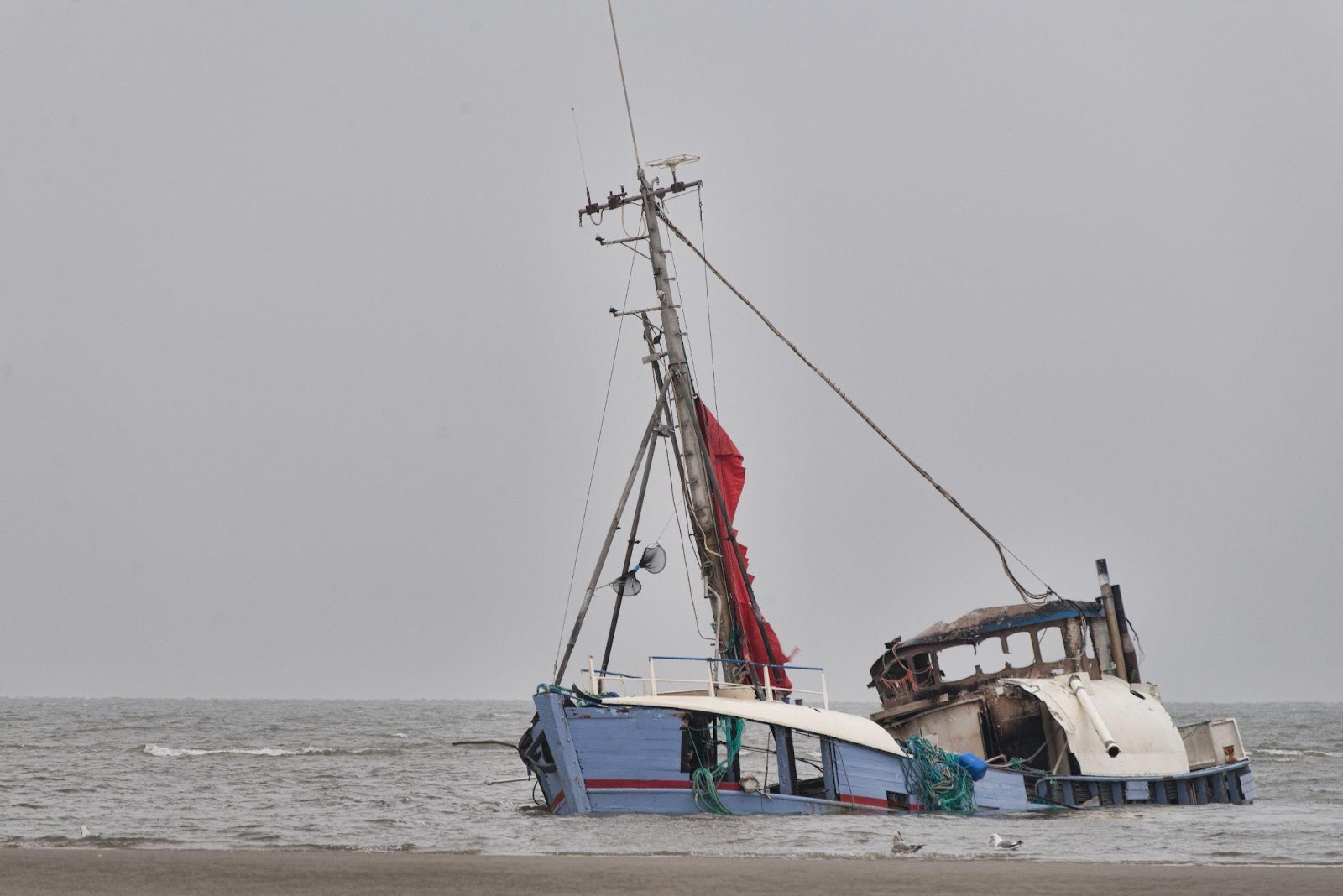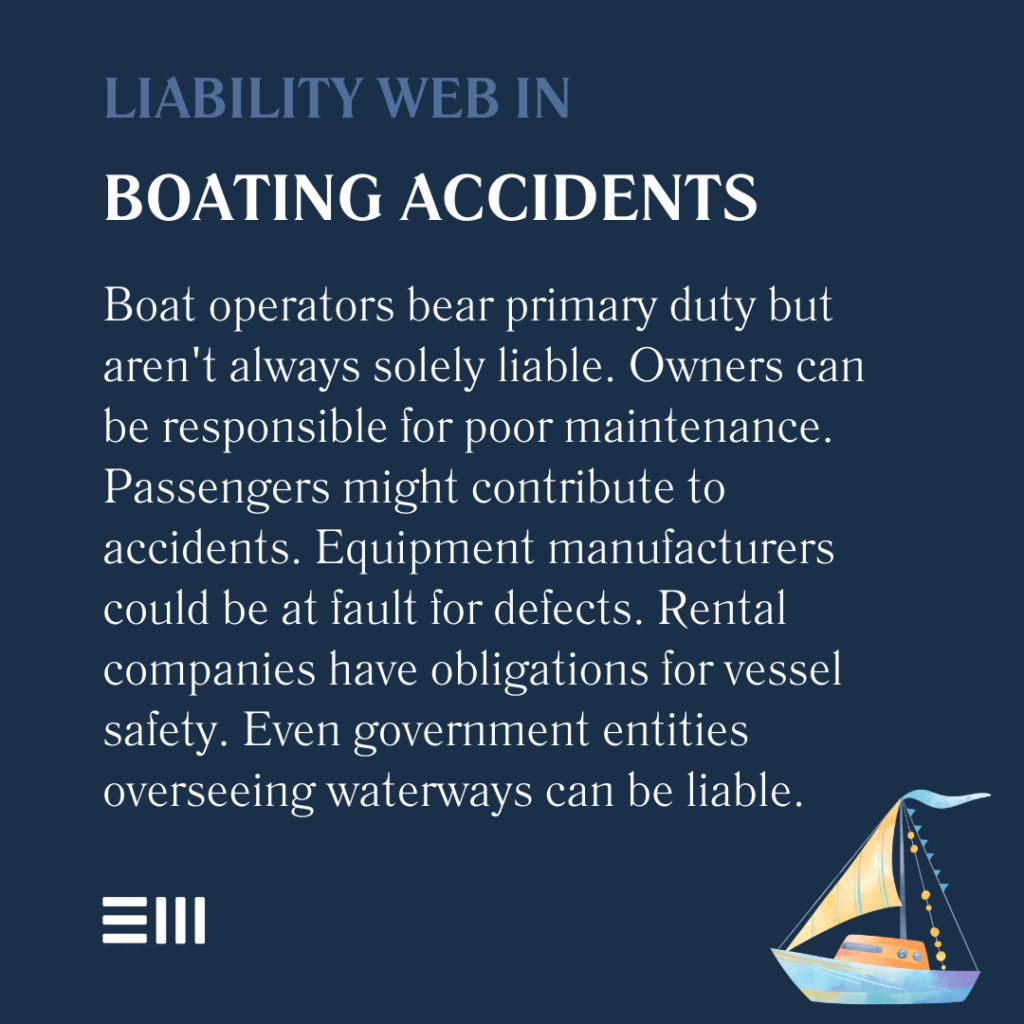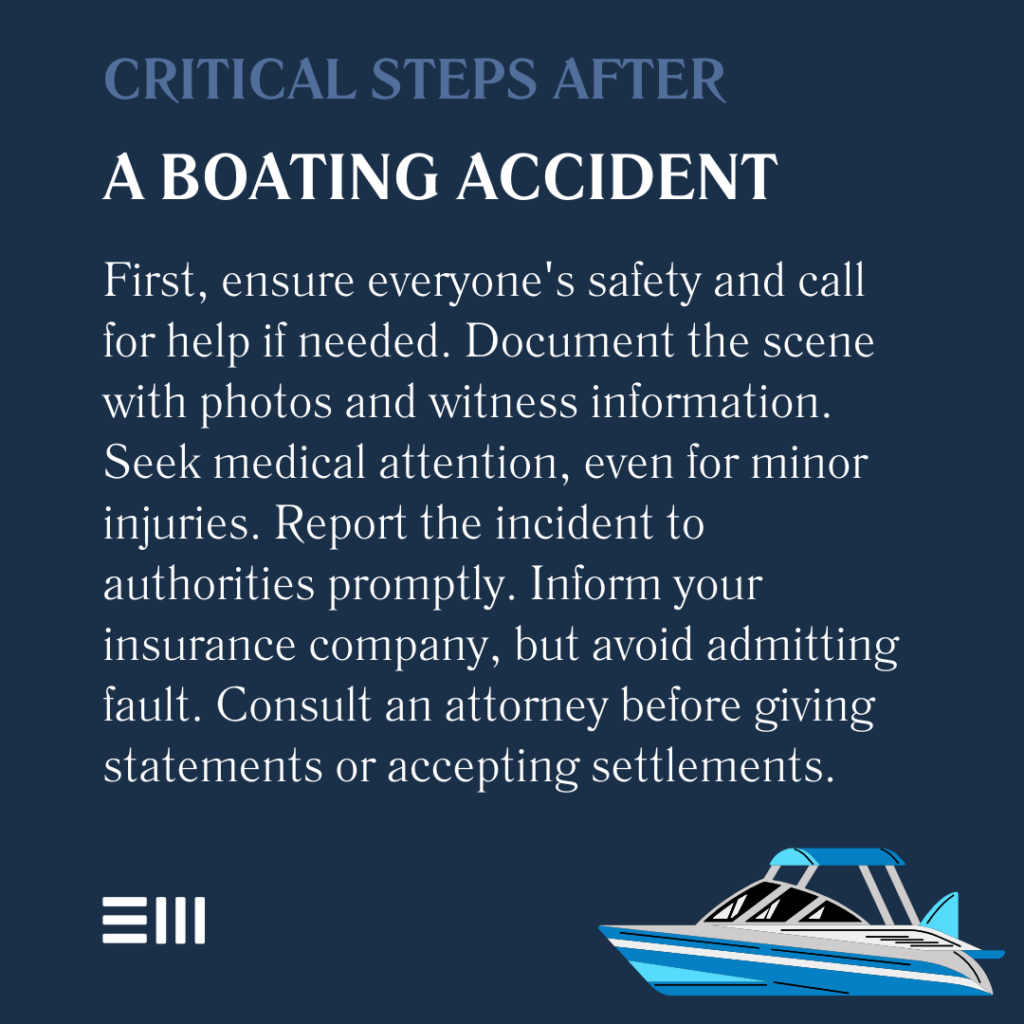
There were 57 boating accidents in Alabama in 2023, according to data from the US Coast Guard’s Boating Accident Report Database.
Each of these incidents represents a potential tragedy, with lives disrupted and families affected.
Understanding the legal landscape surrounding these accidents is crucial for anyone who enjoys Alabama’s diverse waterways.
Understanding Boating Accidents in Alabama
Alabama’s diverse waterways, from the Gulf Coast to inland lakes and rivers, attract thousands of boating enthusiasts each year.
However, this popularity comes with risks. Boating accidents can occur due to various factors, including operator inexperience, alcohol use, equipment failure, and hazardous water conditions.
Common types of boating accidents in Alabama include:
- Collisions with other vessels;
- Collisions with fixed objects;
- Capsizing;
- Falls overboard;
- Flooding or swamping; and
- Grounding.
Understanding the causes and types of boating accidents is crucial for prevention and determining liability in the event of an incident.
Liability in Boating Accidents
Determining liability in a boating accident can be complex, involving multiple parties and factors.
In Alabama, liability often hinges on the concept of negligence, or the failure to exercise reasonable care while operating a vessel.
Potential liable parties in a boating accident may include:
- Boat operators;
- Boat owners (if different from the operator);
- Passengers;
- Equipment manufacturers;
- Rental companies; and
- Government entities responsible for waterway maintenance.
Each case is unique, and liability may be shared among multiple parties depending on the circumstances of the accident.

Alabama Boating Laws and Regulations
Alabama has specific laws and regulations governing boating activities. Familiarizing yourself with these rules is essential for both preventing accidents and understanding your rights in case of an incident.
Key Alabama boating laws include:
- Mandatory boater education for operators born after April 28, 1954;
- Age restrictions for operating motorized vessels;
- Requirements for life jackets and other safety equipment;
- Prohibited operations, such as boating under the influence (BUI); and
- Accident reporting requirements.
Violations of these laws can significantly impact liability determinations in the event of an accident.
Legal Recourse After a Boating Accident
If you’ve been involved in a boating accident in Alabama, you have several legal options available.
The appropriate course of action depends on the specifics of your case, including the severity of injuries, property damage, and determined liability.
Potential legal recourse includes:
- Insurance claims;
- Personal injury lawsuits;
- Wrongful death lawsuits (for fatal accidents); and
- Product liability claims (for accidents caused by defective equipment).
Each option has its own procedures, timelines, and potential outcomes. Consulting with an experienced maritime attorney can help you navigate these complex legal waters.
Steps to Take After a Boating Accident
The actions you take immediately following a boating accident can significantly impact your ability to seek legal recourse.
Here’s a step-by-step guide:
- Ensure safety: Check for injuries and get to safety if possible.
- Call for help: Contact the U.S. Coast Guard or local authorities.
- Document the scene: Take photos and gather contact information from witnesses.
- Seek medical attention: Even if injuries seem minor, get checked by a healthcare professional.
- Report the accident: File an official report with the Alabama Law Enforcement Agency.
- Notify your insurance company: Report the incident but avoid admitting fault.
- Consult an attorney: Seek legal advice before providing statements or accepting settlements.
Following these steps can help protect your rights and strengthen your potential legal case.

Compensation in Boating Accident Cases
If you pursue legal action after a boating accident, you may be eligible for various types of compensation, depending on the circumstances of your case.
Potential damages include:
- Medical expenses (current and future);
- Lost wages and earning capacity;
- Property damage;
- Pain and suffering;
- Emotional distress;
- Loss of enjoyment of life; and
- Punitive damages (in cases of gross negligence).
An experienced attorney can help you assess the full extent of your damages and fight for fair compensation.
Statute of Limitations
In Alabama, the statute of limitations for filing a lawsuit related to a boating accident is generally two years from the date of the incident.
However, there are exceptions to this rule, and certain circumstances may alter the timeline.
It’s crucial to act promptly after an accident to ensure you don’t lose your right to seek legal recourse. Consulting with an attorney as soon as possible can help you understand and adhere to relevant deadlines.
Prevention and Safety Measures
While understanding liability and legal recourse is important, preventing boating accidents should be the primary goal for all water enthusiasts.
Here are some key safety measures:
- Complete a boater education course;
- Always wear a life jacket;
- Avoid alcohol while boating;
- Check weather conditions before heading out;
- Maintain your vessel and safety equipment;
- Be aware of your surroundings and other boats; and
- Follow navigation rules and local regulations.
By prioritizing safety, you can help reduce the risk of accidents and enjoy Alabama’s beautiful waterways responsibly.
Frequently Asked Questions About Boating Accidents in Alabama
Navigating the legal landscape of boating accidents can be challenging.
Here are answers to some commonly asked questions we receive to help clarify key points.
Who Is Responsible for a Boating Accident?
Responsibility for a boating accident depends on the specific circumstances. It could be the boat operator, the boat owner, a passenger, or even a manufacturer if equipment failure was involved.
In some cases, multiple parties may share liability.
What if the Accident Was Caused by a Rented Boat?
If the accident involved a rented boat, liability might extend to the rental company, especially if they failed to properly maintain the vessel or provide adequate instructions.
However, the renter may still be held responsible for their actions while operating the boat.
How Does Insurance Work for Boating Accidents?
Boat insurance policies can cover various aspects of an accident, including property damage, injuries, and legal fees.
However, coverage varies widely between policies. It’s important to review your insurance coverage and understand its limits before an accident occurs.
What if the Other Party Doesn’t Have Insurance?
If the at-fault party doesn’t have insurance, you may need to pursue legal action directly against them.
In some cases, your own insurance policy might include uninsured boater coverage, similar to uninsured motorist coverage in auto insurance.
Can I Still Seek Compensation if I Was Partially at Fault?
Alabama follows a contributory negligence rule, which means if you’re found to be even slightly at fault for the accident, you may be barred from recovering damages.
This makes it crucial to have skilled legal representation to protect your interests.
What Evidence Is Needed for a Boating Accident Claim?
Important evidence can include accident reports, witness statements, photos of the scene and damages, medical records, and expert testimonies.
Gathering and preserving evidence as soon as possible after the accident is crucial.
How Long Does a Boating Accident Case Take to Resolve?
The duration of a case can vary widely depending on its complexity, the severity of injuries, and whether it settles or goes to trial. Some cases may resolve in a few months, while others can take years.
What if the Accident Happened in Federal Waters?
If the accident occurred in federal waters, maritime law may apply, which can differ from state law. These cases can be more complex and may require specialized legal expertise.
Contact Baxley Maniscalco for Expert Legal Guidance
Navigating the aftermath of a boating accident can be overwhelming. At Baxley Maniscalco, we’re here to help you understand your rights and explore your legal options.
Our experienced team of maritime attorneys has a deep understanding of Alabama’s boating laws and a proven track record of successfully representing accident victims.
Don’t face this challenging time alone. Contact Baxley Maniscalco today for a free consultation.
Can't find what you're looking for? Search our site below.










